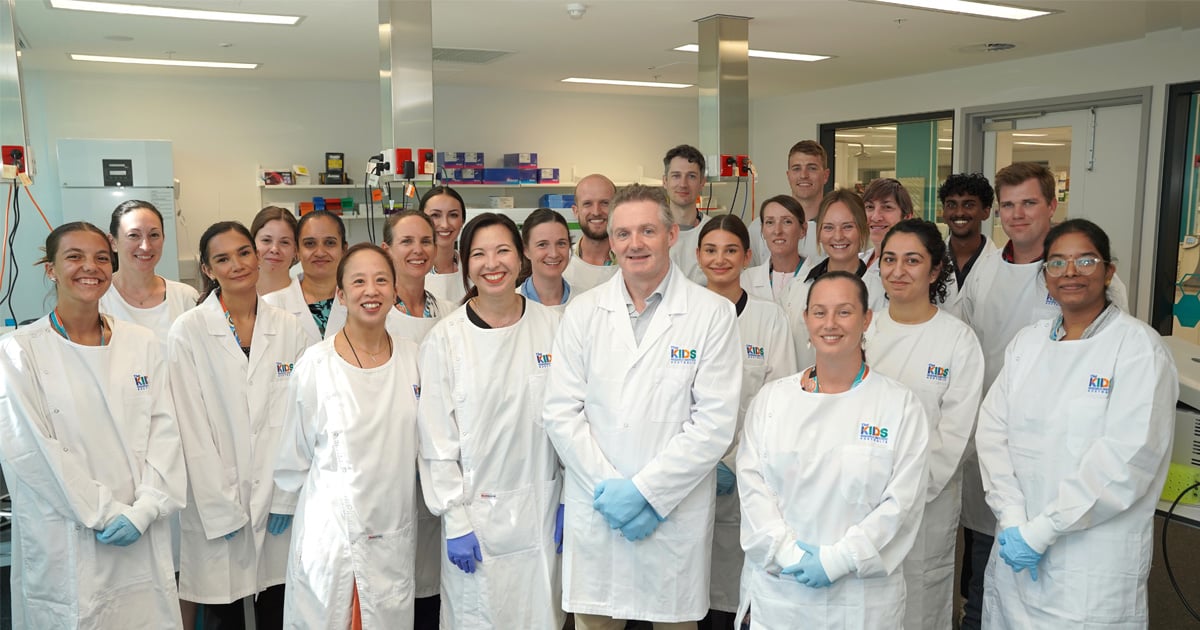
Brain cancer is the leading cause of death by disease in Australian children, making Brain Cancer Awareness Month - held each May - all the more important.
At The Kids Research Institute Australia, our Brain Tumour Research team is leading the charge to change the story for children diagnosed with brain cancer by working on safer, more effective treatments.
Established in 2011, the Brain Tumour Research team was formed to bring research and clinical care together to improve outcomes for children with brain tumours. Today, the team is recognised as one of Australia’s largest research groups primarily focused on paediatric brain cancer, with a strong international reputation for impact-driven science.
The team’s work spans tumour biology, treatment response, the developing brain, and immune interactions. These areas are just some of the projects underway at The Kids:
- Developing accurate preclinical models: Understanding how childhood brain tumours grow, spread, and respond to treatment requires sophisticated models. Our team has developed some of the most advanced and age-appropriate paediatric mouse models of paediatric brain cancer, which are critical for testing new therapies before they reach clinical trials. These models provide powerful insight into tumour behaviour and help researchers identify the most promising treatments to take forward.
- Harnessing the immune system: Immunotherapy has transformed care in many adult cancers, but progress in childhood brain tumours drastically lags behind. Our researchers are exploring how immunotherapy could interact with brain tumours in children and identifying ways to harness the body’s own immune system to better fight the disease. This work is helping pave the way for a new generation of immunotherapies tailored specifically to the developing brain.
- Protecting the developing brain: Current treatments for brain cancer can have serious, lifelong effects on children. Our team is investigating how therapies impact the developing brain during and after treatment. Using this knowledge, we hope to design safer, more targeted approaches that reduce the long-term effects of today’s treatments. This includes research into how radiation can be reduced in treatment, with the goal of improving quality of life for survivors without compromising effectiveness.
- Understanding surgery’s hidden impact: Surgery is often the first step in treating brain tumours, but its effects on the brain’s immune and healing responses remain poorly understood. Our researchers are mapping the brain’s recovery process after surgery to uncover how it might be harnessed to support better outcomes. This work could lead to new post-surgical therapies that work with the body’s natural healing processes to eliminate any remaining cancer cells.
- Translating research into clinical trials: With strong ties between The Kids and Perth Children’s Hospital, the team understands what it takes to move new treatments into the clinic. A major focus is generating the preclinical evidence required to form the basis of new clinical trials. The team also plays a key role in early phase clinical trials both in Australia and overseas. Through global partnerships and collaborative efforts, we’re testing new drug combinations for aggressive brain tumours and expanding access to promising new therapies, ensuring children everywhere benefit from the latest breakthroughs.
Our researchers are a passionate, collaborative, multidisciplinary group dedicated to understanding childhood brain tumour biology and developing more effective, less harmful treatments. Every project is driven by a singular goal: to see a future where no child dies from brain cancer - because we’ve developed the therapies that can cure it.
By better understanding these diseases and accelerating the path to new treatments, we’re working to build a future where all children survive and thrive.
